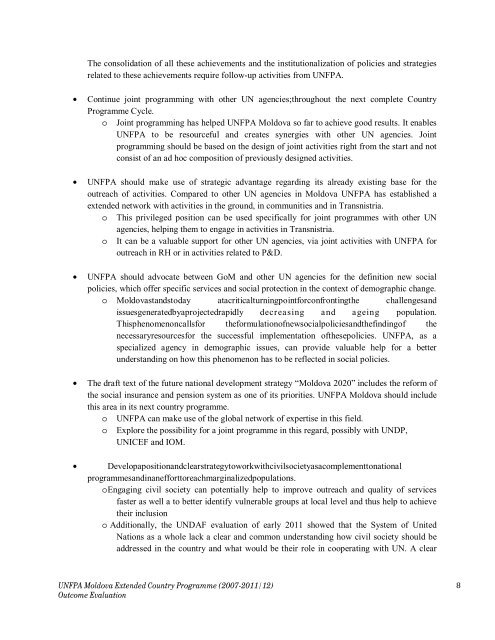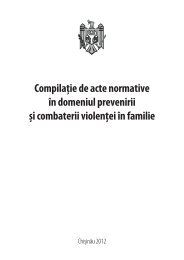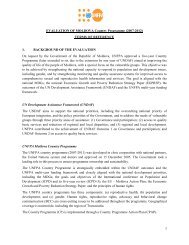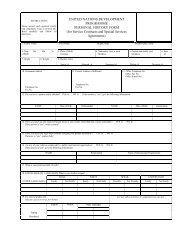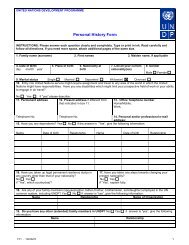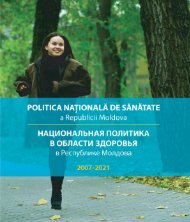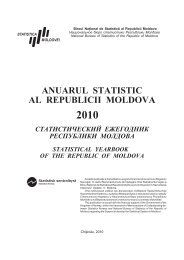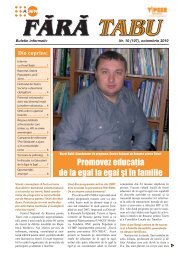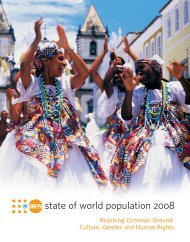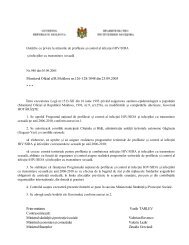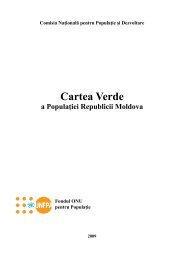Country Programme (2007-2011/2012) evaluation - UNFPA Moldova
Country Programme (2007-2011/2012) evaluation - UNFPA Moldova
Country Programme (2007-2011/2012) evaluation - UNFPA Moldova
Create successful ePaper yourself
Turn your PDF publications into a flip-book with our unique Google optimized e-Paper software.
The consolidation of all these achievements and the institutionalization of policies and strategies<br />
related to these achievements require follow-up activities from <strong>UNFPA</strong>.<br />
• Continue joint programming with other UN agencies;throughout the next complete <strong>Country</strong><br />
<strong>Programme</strong> Cycle.<br />
o Joint programming has helped <strong>UNFPA</strong> <strong>Moldova</strong> so far to achieve good results. It enables<br />
<strong>UNFPA</strong> to be resourceful and creates synergies with other UN agencies. Joint<br />
programming should be based on the design of joint activities right from the start and not<br />
consist of an ad hoc composition of previously designed activities.<br />
• <strong>UNFPA</strong> should make use of strategic advantage regarding its already existing base for the<br />
outreach of activities. Compared to other UN agencies in <strong>Moldova</strong> <strong>UNFPA</strong> has established a<br />
extended network with activities in the ground, in communities and in Transnistria.<br />
o This privileged position can be used specifically for joint programmes with other UN<br />
agencies, helping them to engage in activities in Transnistria.<br />
o It can be a valuable support for other UN agencies, via joint activities with <strong>UNFPA</strong> for<br />
outreach in RH or in activities related to P&D.<br />
• <strong>UNFPA</strong> should advocate between GoM and other UN agencies for the definition new social<br />
policies, which offer specific services and social protection in the context of demographic change.<br />
o <strong>Moldova</strong>standstoday atacriticalturningpointforconfrontingthe challengesand<br />
issuesgeneratedbyaprojectedrapidly decreasing and ageing population.<br />
Thisphenomenoncallsfor theformulationofnewsocialpoliciesandthefindingof the<br />
necessaryresourcesfor the successful implementation ofthesepolicies. <strong>UNFPA</strong>, as a<br />
specialized agency in demographic issues, can provide valuable help for a better<br />
understanding on how this phenomenon has to be reflected in social policies.<br />
• The draft text of the future national development strategy “<strong>Moldova</strong> 2020” includes the reform of<br />
the social insurance and pension system as one of its priorities. <strong>UNFPA</strong> <strong>Moldova</strong> should include<br />
this area in its next country programme.<br />
o <strong>UNFPA</strong> can make use of the global network of expertise in this field.<br />
o Explore the possibility for a joint programme in this regard, possibly with UNDP,<br />
UNICEF and IOM.<br />
• Developapositionandclearstrategytoworkwithcivilsocietyasacomplementtonational<br />
programmesandinanefforttoreachmarginalizedpopulations.<br />
o Engaging civil society can potentially help to improve outreach and quality of services<br />
faster as well a to better identify vulnerable groups at local level and thus help to achieve<br />
their inclusion<br />
o Additionally, the UNDAF <strong>evaluation</strong> of early <strong>2011</strong> showed that the System of United<br />
Nations as a whole lack a clear and common understanding how civil society should be<br />
addressed in the country and what would be their role in cooperating with UN. A clear<br />
<strong>UNFPA</strong> <strong>Moldova</strong> Extended <strong>Country</strong> <strong>Programme</strong> (<strong>2007</strong>-<strong>2011</strong>/12)<br />
Outcome Evaluation<br />
8


